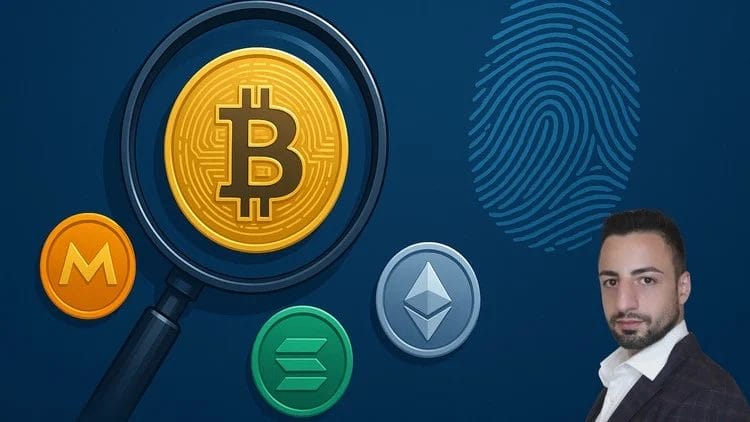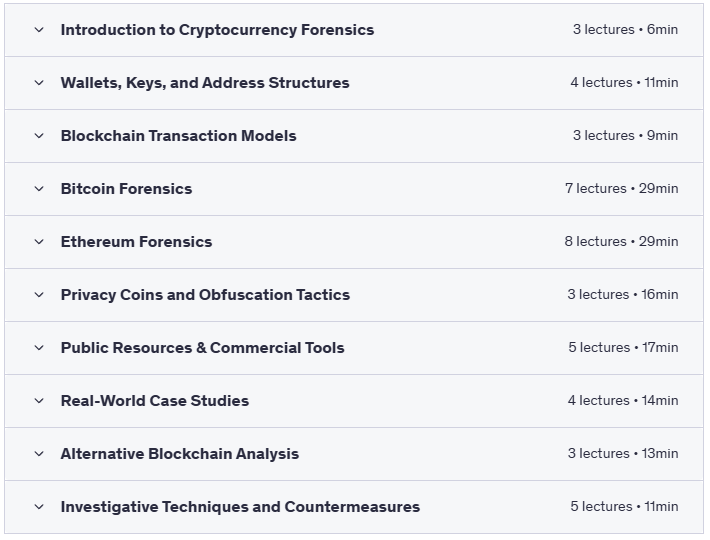Cryptocurrency Forensics 2025 – Full Guide
Learn cryptocurrency forensics: trace funds, detect mixers, investigate wallets, and follow blockchain trails.
This course includes:
-
2.5 hours on-demand video
DOWNLOAD
You have to be logged in and our VIP Members to see the Download Links
FREE DOWNLOAD FOR ALL VIP MEMBERS!

What you’ll learn
-
Understand the fundamentals of blockchain technology, wallets, private/public keys, and how cryptocurrency transactions work.
-
Trace and analyze blockchain transactions on Bitcoin, Ethereum, and privacy-focused cryptocurrencies like Monero and Zcash.
-
Identify wallet structures, address types, and transaction patterns using forensic techniques such as clustering, change address detection, and UTXO tracing.
-
Investigate obfuscation tactics including CoinJoins, mixers, DeFi swaps, and cross-chain laundering via bridges and token swaps.
-
Apply forensic methods to real case studies such as the BitMart hack, Crypto-com breach, Tornado Cash laundering, and Ronin Bridge exploit.
-
OSINT techniques: search devices for crypto addresses, keys, and seed phrases using regex, crack Ethereum wallets, trace Bitcoin ATM activities and more.
Course content

Requirements
-
No prior experience in blockchain or forensics is required — the course starts with the basics.
-
Basic computer knowledge and comfort using web-based tools and platforms.
Description
Learn how to trace Bitcoin, Ethereum, and Monero transactions using real-world blockchain forensics and crypto investigation techniques. This course is designed for cybersecurity professionals, law enforcement, compliance officers, and blockchain analysts who want to follow the money across crypto networks.
You’ll start with the fundamentals and progress to advanced forensic techniques used in real investigations.
What You’ll Learn:
- How wallets, private keys, seed phrases, and addresses work across Bitcoin and Ethereum
- Blockchain analysis using the UTXO model, account-based systems, and smart contracts
- Detecting laundering tactics: CoinJoins, mixers, cross-chain swaps, and DeFi obfuscation
- Identifying change addresses, wallet clusters, and suspicious transaction patterns
- Using OSINT and regex to search systems for wallet files, addresses, and seed data
- Tracing privacy coins like Monero and Zcash, and understanding their forensic limitations
- Investigating real cases: BitMart hack, Ronin Bridge exploit, Crypto-com 2FA breach
- Tools of the trade: public explorers and commercial platforms used by law enforcement
- Seizing crypto assets and tracking transactions across networks and DeFi protocols
- Analyse USDT, swapping methods and much more.
By the end of this course, you’ll be equipped with the skills to analyze crypto crime, trace transactions with confidence, and apply forensic investigation techniques across Bitcoin, Ethereum, and beyond — including privacy coins and decentralized finance.
Who this course is for:
- Law enforcement, compliance officers, and digital forensic investigators seeking practical skills to follow the money on-chain.
- Crypto enthusiasts and ethical hackers
- Anyone curious about how crypto crimes work
DOWNLOAD
You have to be logged in and our VIP Members to see the Download Links
FREE DOWNLOAD FOR ALL VIP MEMBERS!
Related
Be the first to review “Cryptocurrency Forensics 2025 – Full Guide” Cancel reply
You must be logged in to post a review.





Reviews
There are no reviews yet.